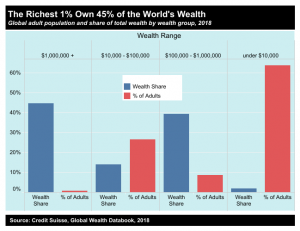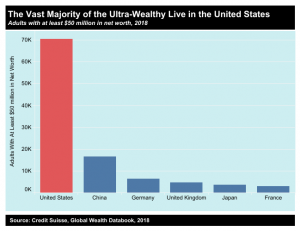The state of the world is fairly distressing at first glance.
Images of human suffering flood our phones, computer screens, televisions, and printed pages every day.
War, famine, social inequality, prejudice, institutional corruption, economic exploitation, environmental ruin, drug addiction, physical disease, organized crime, disorganized crime, human trafficking … there are so many people suffering from so many causes all the time.
I know some feel sad at hearing stories of pain and suffering, some get frustrated we don’t take more action, some get confused at not knowing what they can do, and some just feel grateful that isn’t them.
I also know spamming statistics isn’t always very helpful, but I’ve curated and cited a few factoids that paint a broad picture of where I see we are at.
The world is greatly unequal: a minority prospers while a majority struggles to survive. According to a World Bank study from 2008, at least 80 percent of humanity lived on less than $10. A 2018 Global Wealth Databook study found that 1 percent of the world’s population (people with more than $1 million) owned 45 percent of its wealth. An IPS analysis of Forbes’ 2018 Billionaire list found that 10 people had more wealth than entire countries including Switzerland, Argentina, Thailand, Belgium, and Norway. And finally, a 2007 study from the UN’s Human Development Program found that 80 percent of the world’s population lived in countries where economic inequality was worsening.
[For what that $10 a day stat means in the U.S., the average amount of Welfare received by single person households in the U.S. was $300 per month ($10 per day) according to welfareinfo.org, not counting some food stamps, child care, medical or utility assistance benefits.]
People kill each other. In terms of war, the Wikipedia Page for “List of ongoing armed conflicts” shows three major wars (more than 10,000 dead in a year), seven wars (1,000 to 9,999 dead in a year), 25 minor conflicts (100 to 999 dead in a year) and 23 skirmishes/clashes (less than 100 dead in a year). According to data compiled by Armed Conflict Location & Event Data Project (ACLED) last year there were 35,941 deaths in Afghanistan, where war has claimed more than 2 million lives since 1978; 27,765 died in Mexico, where the Mexican Drug War rages; 22,201 were killed in Yemen where Crisis grips the country; and at least 19,799 died in Syria, which the world has watched tear itself apart since 2011. And these stats don’t even include incidents of gang or authoritarian violence or violent crime occurring, even in the U.S., on a regular basis.
We waste and destroy without regard for consequence. Without getting into discussions about whether one or another political party actually provides meaningful solutions to environmental problems, NASA references research from the Intergovernmental Panel on Climate Change that forecasts a global temperature rise of 2.5 to 10 degrees Fahrenheit over the next 100 years, and cites shrinking glaciers, shifting terrain and changes in cyclical events like ice melting and trees flowering as already tangible effects of climate change.
All of this to say, we live in a time of great inequality and injustice. And if you live in the U.S., you are likely sheltered from much of the suffering the masses of humanity face [In fact, a lot of the structures in place benefit the U.S. at others’ expense].
I don’t point this out because I hate my country or my life, but because I think it’s important to acknowledge the reality of our collective situation if we mean to have an inclusive conversation about it.
From this point, one could say that life isn’t fair and that’s the way things have always been and how they must always be. Many people may currently believe that. Fine.
But I do believe Bahá’u’lláh when he says that all human life is not only valuable, but profoundly connected, a part of one whole, interconnected body. We are like cells of a body, and if 80 percent of the cells of our body are not getting the nutrients they need, the entire body becomes gravely ill. When we do not care for or protect a portion of our body, the entire organism suffers. So is the human body, so is the human race.
It really does seem the human race is failing colossally at moving towards a system that takes this reality to heart, though.
Sure we can jokingly look back at the days when science was ignored and prejudice was openly law and say “Wow, those people were idiots,” but I don’t think we are close to getting where we need to be.
Even areas of major improvement in the last 100 years, like women’s suffrage, education and employment seem offset by entrenched or worsening problems, like violence against and trafficking of women.
To be honest, I don’t foresee us being able to hold off even worse days for humanity, be it sooner or later.
I have met some truly inspirational people in my life, some incredibly powerful people who it seems could move a country by themselves. And for all I know, there are many of those souls out there, waiting to just be talked to, to have their spark ignited to become lights in this space we all seem to see darkening.
But I feel like most of us, myself included, are going through life at a pretty low level of consciousness most of the time.
We are hoping someone else will solve the big problems we face. And that simply will not happen.
Any meaningful steps towards justice, and eventual unity, require at least a majority of the interested parties to take some kind of action, to participate somehow.
A world built around communities where everyone is valued and nourished, I would argue, is just the next step in our collective evolution. Someday we will see that cooperation is not only possible, it is necessary for our collective growth.
So, I try to not let it bother me that we are not there yet, because I am confident that day will come. It would not surprise me, though, if in my lifetime or after some combination of super-disease, environmental catastrophe, nuclear war, or global economic collapse ravages the earth’s population. But that may be necessary to force us to collectively examine our values, habits and the way our society is constructed. Great suffering may be necessary for us to realize our collective potential.
It makes me sad that my potential child may see an even worse world than I (I swear it was broken when we got it), but, God willing, I hope be up to the task of preparing them for such a world.
I take comfort in the thought that, someday in the distant future, our descendants will looks back at us and say: “Wow, they really were idiots, huh?”


